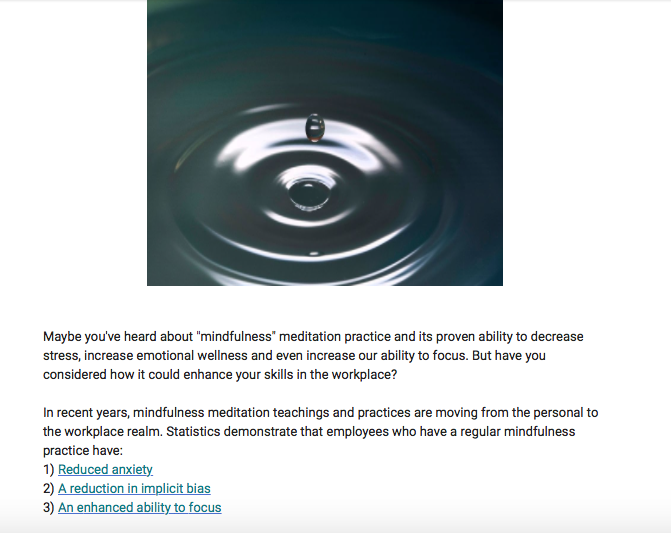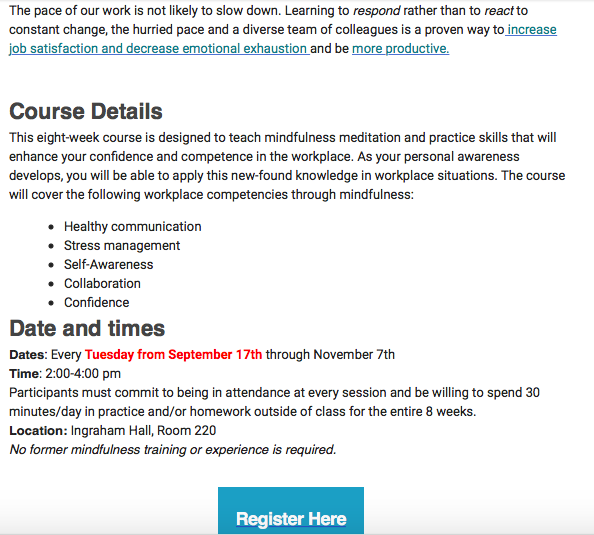
CW: Productivity shaming, blaming individuals for systemic problems
I debated the title of this week’s post. Here are some of the rejects:
- Workers of the World, Unite! You Have Nothing to Lose But Your Employer’s Mindfulness Program!
- Pay Attention to Your Breathing, Karen, Not the Wage Gap
- Meditation Fixes Racism Because…Science?
Workplace Hellness has received its first reader submission! If you have to endure terrible workplace wellness programming, you can submit examples using Twitter, Facebook, or email. I won’t post your name or organization with your submission unless you request it. It would also be wonderful to hear from you why you think your submission is particularly interesting, egregious, or hilarious.
Today we’re diving into mindfulness and why it’s troubling in the context of workplace wellness programs. This email from the University of Wisconsin system lays bare the often-subtextual demands mindfulness programming makes on employees. (I’m excerpting the email here and will post a screenshot of the full email at the end.)
Let’s start at the top with the stock image of a drop of water falling into a still pool: peak mindfulness imagery achieved!

At least this one avoids showing a white woman sitting cross-legged on a beach looking out at the sunset.
The email begins:
Maybe you’ve heard about “mindfulness” meditation practice and its proven ability to decrease stress, increase emotional wellness and even increase our ability to focus. But have you considered how it could enhance your skills in the workplace?
I appreciate how forthright the email is about its agenda: mindfulness exists in this context to make you a better employee! I also enjoy overstatement in all of its glorious forms, and it shows up here where the authors claim that mindfulness has a “proven ability” to heal all that ails you in your modern life. Truth: I have been doing some form of meditative practice for 8-ish years, and I have yet to become a super-focused, productive, and non-anxious human. And if you don’t trust me, I’ll make a blatant appeal to science, because Science™, you know, just like the authors of this email.
In recent years, mindfulness meditation teachings and practices are moving from the personal to the workplace realm. Statistics demonstrate that employees who have a regular mindfulness practice have:
- Reduced anxiety
- A reduction in implicit bias
- An enhanced ability to focus (The link doesn’t work for me, but maybe it will for you?)
As a teacher of college writing, I feel duty-bound to point out the fallacy of “statistics demonstrate.” Statistics are things that humans create, interpret, and use in arguments, not little logic creatures that show up and demonstrate things to us. Additionally, when you click through to the studies, you’ll see that they have small sample sizes, short-duration interventions, or take place in experimentally-controlled settings, and therefore don’t reflect how mindfulness might impact your day-to-day work life over a long period of time.
And in case you missed it, mindfulness is going to solve workplace racism! If you follow the link, you’ll discover that it will only solve racism and ageism, but not sexism—so don’t get your hopes up that mindfulness will make Chad the VP any less harassy.
The pace of our work is not likely to slow down. Learning to respond rather than to react to constant change, the hurried pace and a diverse team of colleagues is a proven way to increase job satisfaction and decrease emotional exhaustion and be more productive.
Points to the message authors for stating outright that the university is not going to change workplace conditions to improve employees’ lives. It’s much easier to fight a monster when it has showed its face, and this monster is named Capitalism. I can imagine someone presenting this to a shadowy board of directors and saying, “We can make them happier and more efficient without doing anything to make their lives better!” They would all then cackle in unison, twirl their mustaches, and descend into their secret bunkers.

<Ranty bit> The authors of this message are grossly misrepresenting the goals of meditation, and that angers me. Many mindfulness/meditation practices are based in Buddhist meditation practices, and the goal of many of these is to detach from the material world. Your workplace doesn’t want you to do that! Your workplace wants you to detach from your dissatisfaction with your job but still CARE SUPER-HARD about your job.
This is partly why the corporate use of mindfulness & meditation practices is divorced from historical, cultural, and religious contexts. Your boss doesn’t want you to know (cue conspiracy-discovery music) the true goals of meditation because then you might not care if your employer makes an extra bajillion dollars this quarter. What if the practice works too well? What if you detach from the concept of work or achievement? This possible outcome kind of makes me want to recommend that everyone reading this become a hardcore meditator, but I don’t trust your workplace to hire someone qualified to teach you. Alas!</Ranty bit>
Finally, here’s the kicker: the course is 2 hours a week for 8 weeks and requires you to do at least 30 minutes of homework each day!
Participants must commit to being in attendance at every session and be willing to spend 30 minutes/day in practice and/or homework outside of class for the entire 8 weeks.
I’m tempted to think that this is an experiment designed to test whether a mindfulness course that requires 5.5 hours of your time each week increases or decreases your stress. Maybe participants will be less stressed because they didn’t have to be in their offices and beholden to their emails for 2 hours once a week. Maybe participants will be more stressed because there are 5.5 hours in their week that they were going to use to plot the coming revolution but now they have to slowly eat a raisin and write a journal entry about the experience. Who knows?! Statistics will demonstrate something, though!
I could paraphrase this email thus:
We’re not going to change how we do business even though it hurts you; we’re also not going to take responsibility for building a workplace culture free from discrimination. Instead, we’re going to make you responsible for being happy about being overworked and also make racism an individual instead of institutional problem (lol, don’t even ask us about sexism).
Am I being unkind in my paraphrase? I would argue no. This email is particularly bold in its declaration of intentions and motivations, but its arguments run under the surface of many, if not most, workplace wellness mindfulness initiatives.
Here’s a huge caveat to everything I just wrote: I find practices like taijiquan and yoga pranayama helpful for my mental and emotional health. What I object to is the corporatization of mindfulness in the service of creating employees who don’t push back on the status quo.







